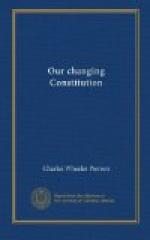IV
THE EIGHTEENTH AMENDMENT
Could Washington, Madison, and the other framers of the Federal Constitution revisit the earth in this year of grace 1922, it is likely that nothing would bewilder them more than the recent Prohibition Amendment. Railways, steamships, the telegraph, the telephone, automobiles, flying machines, submarines—all these developments of science, unknown in their day, would fill them with amazement and admiration. They would marvel at the story of the rise and downfall of the German Empire; at the growth and present greatness of the Republic they themselves had founded. None of these things, however, would seem to them to involve any essential change in the beliefs and purposes of men as they had known them. The Prohibition Amendment, on the contrary, would evidence to their minds the breaking down of a principle of government which they had deemed axiomatic, the abandonment of a purpose which they had supposed immutable. As students of the science of government they would realize that the most fundamental change which can overtake a free people is a change in their frame of mind, for to that everything else must sooner or later conform.
The amendment was proposed by Congress in 1917 and proclaimed as having been ratified in 1919.[1]
[Footnote 1: 40 Stat. 1050, 1941.]
The comparative ease and dispatch with which it was put through argue alike the skill and vigor of its sponsors and the strength of the sentiment behind them. Legal warfare over the amendment did not end, however, with its ratification by the legislatures of the requisite number of states. Passions had been aroused. Vast property interests were menaced. Moreover, in the minds of students of government the amendment stirred misgivings which were quite independent of the sentimental and material considerations involved. Eminent counsel were retained and a determined effort was made to defeat or nullify the amendment in the courts. To this end suits were begun in various jurisdictions to test its validity and enjoin the enforcement of the Volstead Act, which sought to carry it into effect. Two sovereign states (Rhode Island and New Jersey) joined in the attack and through their respective Attorneys General brought original suits in the United States Supreme Court to have the amendment declared invalid. Seven test cases were argued together in the Supreme Court, five days in all being devoted to the argument. It will be of interest to note some of the reasons advanced against the validity of the amendment, as they are summarized in the official report.[1]
[Footnote 1: National Prohibition cases, 253 U.S., 350.]
The Attorney General of the State of Rhode Island argued[1] that:




